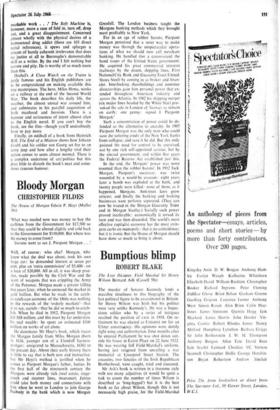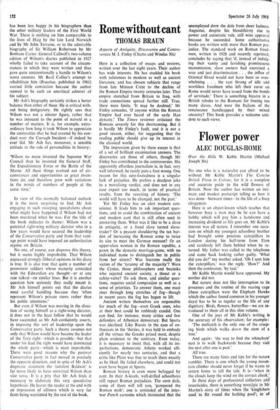The Lost Dictator, Field Marshal Sir Henry Wilson Bernard Ash
(Cassell 50s)
Bumptious blimp
ROBERT BLAKE
The murder of Senator Kennedy lends a macabre timeliness to this biography of the last political figure to be assassinated in Britain. Sir Henry Wilson was Irish but his politics were very unlike Kennedy's. He was a loqua- cious soldier who by a series of intrigues reached the position of acs in 1918. On re- tirement he was elected as Unionist MP for an Ulster constituency. His opinions were dottily right wing and authoritarian. Four months after he entered Parliament he was shot down out- side his house in Eaton Place on 22 June 1922. He was wearing full Field-Marshal's uniform, having just retwned from unveiling a war memorial at Liverpool Street Station. The assassins, two fanatics of the Irish Republican Brotherhood, were caught, tried and executed.
Mr Ash's book is written in a tiresome style with too many adjectives (it would be quite a task to count the number of times Wilson is described as 'long-legged') but it is the best book so far about Wilson, though this is not necessarily high praise, for the Field-Marshal has been less happy in his biographers than the other military leaders of the First World War. There is nothing on him comparable to the lives of Haig by the late Lord Norwich and by Mr John Terraine, or to the admirable biography of Sir William Robertson by Mr Bonham Carter. General Callwell's two-volume edition of Wilson's diaries published in 1927 wholly failed to take account of the circum- stances in which they were written and thus gave quite unintentionally a handle to Wilson's worst enemies. Mr Basil Collier's attempt to rehabilitate him (Brasshat, published in 1961) carried little conviction because the author seemed to be such an uncritical admirer of his subject Mr Ash's biography certainly strikes a better balance than either of these. He is critical with- out being denigratory. He rightly sees that Wilson was not a sinister figure, rather that he was innocent to the point of naiveté in a number of matters. It is, for example, extra- ordinary how long it took Wilson to appreciate the animosities that he had created by his con- duct over the Curragh- Incident—if indeed he evei'did. Mr Ash has, moreover, a sensible attitude to the role of personalities in history:
'Wilson no more invented the Supreme War Council than he invented the General Staff, the Expeditionary Force or the Battle of the Marne. All these things evolved out of cir- cumstances and opportunities as great inven- tions do, and therefore grew with variations in the minds of numbers of people at the same time.'
In view of this normally balanced outlook it is the more surprising to find Mr Ash engaging in such sweeping speculations about what might have happened if Wilson had not been murdered when he was. For the title of the book indicates its theme: Wilson was a potential right-wing military dictator who in a few years would have secured the leadership of the Conservative party and from that vant- age point would have imposed an authoritarian regime on Britain.
No one, of course, can disprove this theory, but it seems highly improbable. That Wilson expressed strongly illiberal opinions in his diary is true. It is also true that quite a number of prominent soldiers whose maturity coincided with the Edwardian era thought—or at any rate talked—on similar lines. But it is another question how seriously they really meant it. Mr Ash himself points out that the diaries need careful handling because they 'often represent Wilson's private views rather than his public intentions.'
But even if Wilson was moving in the direc- tion of seeing himself as a right-wing dictator, it does not in the least follow that he would have succeeded, as Mr Ash confidently asserts, in iinposing this sort of leadership upon the Conservative party. Such a theory assumes not only that Wilson would have become the leader of the Tory right—which is possible—but that under his lead the right would have dominated the whole party—which is most improbable. There were good reasons why the postwar Conservative party in fact moved in precisely the opposite direction, and in spite of Mr Ash's dogmatic statement the 'indolent Baldwin' is far more likely to have outwitted Wilson than vice versa. It is a pity that Mr Ash finds it necessary to elaborate this very speculative hypothesis. He leaves the reader it the end with an impression of silliness which is very. far . from being warranted by the rest of the book.







































 Previous page
Previous page